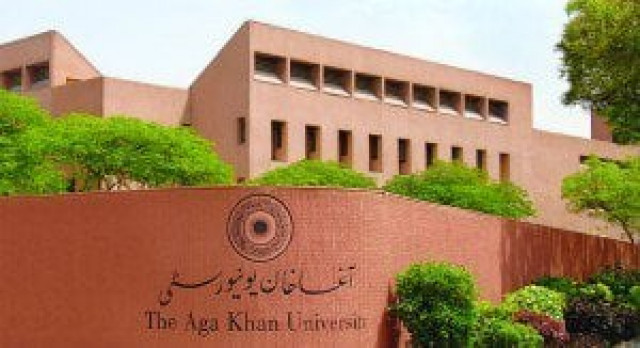Aga Khan University contributes Rs103 billion every year: study
Report’s authors say university a role model for tertiary education, medical care

The Aga Khan University’s Medical College received two ASPIRE awards - for international excellence in education in a medical school - from the Association for Medical Education in Europe in Prague.
The annual economic impact study by the university, conducted by a team of economists from US-based Centennial Group International and launched in Islamabad on Wednesday, found that it was supporting 42,000 jobs. Moreover, it found that Aga Khan University’s (AKU spending has a multiplier effect, with every rupee of its direct gross value added generating Rs 7.3 in economic benefits.
This is the first-ever study of AKU’s economic impact and believed to be the first comprehensive economic impact study of any Pakistani varsity.
Prince Karim inaugurates high-tech facility at AKU
The report finds that AKU was reportedly improving the quality of healthcare and education for the public at large as a pioneer and an influential role model that sparks change within other institutions.
The authors call the university “a nationwide role model for high-quality tertiary education and medical care.”
With its various health initiatives, AKU’s annual spending was equal to around 15 per cent of the government’s total spending on health, and 7.5 per cent of private spending on health.
“Too often, the significant contribution that a leading university makes to the economy is overlooked,” said AKU President and CEO Firoz Rasul. “This study should change that.”
He further claimed that through its various efforts, the AKU was also helping improve the overall quality of life in the country.
The report noted that quality education was a strength which helps increase the earning power of its graduates. Moreover, it provides healthcare services to 1.3 million people every year. By keeping these people healthy and in turn productive — the AKU argues that it helps in that economic contribution.
University rankings: QAU, Aga Khan lead rankings
Moreover, the varsity argued that since it is a major purchaser of goods and services, it generates revenue for local businesses and in turn creates more jobs across the country.
“This economic impact study by the AKU is a trendsetter for our education sector,” Minister for Interior and for Planning, Development and Reform Ahsan Iqbal said.
Former State Bank governor Dr Ishrat Husain, who advised the report’s authors, said, “The study is a rigorous analysis of the difference that AKU has made in Pakistan.”
Centennial’s study analysed AKU’s economic impact in 2015, the latest year for which data was available when the authors began their work in 2016.
Excellence
The AKUH was the first hospital in the country which was accredited by the US-based Joint Commission International while its laboratory was the country’s first accredited by the College of American Pathologists.
Coveted
Seven of Pakistan’s top 10 health researchers are AKU faculty, according to the Pakistan Council for Science and Technology.
Partnering with Government
AKU’s Institute for Educational Development and its Examination Board – both the first private institutions of their kind in Pakistan – have provided valuable assistance to government officials seeking to improve the education system.
Over five years, the university will be working with government health providers to improve health for 11.5 million women and children in Sindh, Punjab and Balochistan through its Umeed-e-Nau (New Hope) project— funded by the Bill and Melinda Gates Foundation.
Published in The Express Tribune, January 12th, 2018.


1724319076-0/Untitled-design-(5)1724319076-0-208x130.webp)
















COMMENTS
Comments are moderated and generally will be posted if they are on-topic and not abusive.
For more information, please see our Comments FAQ